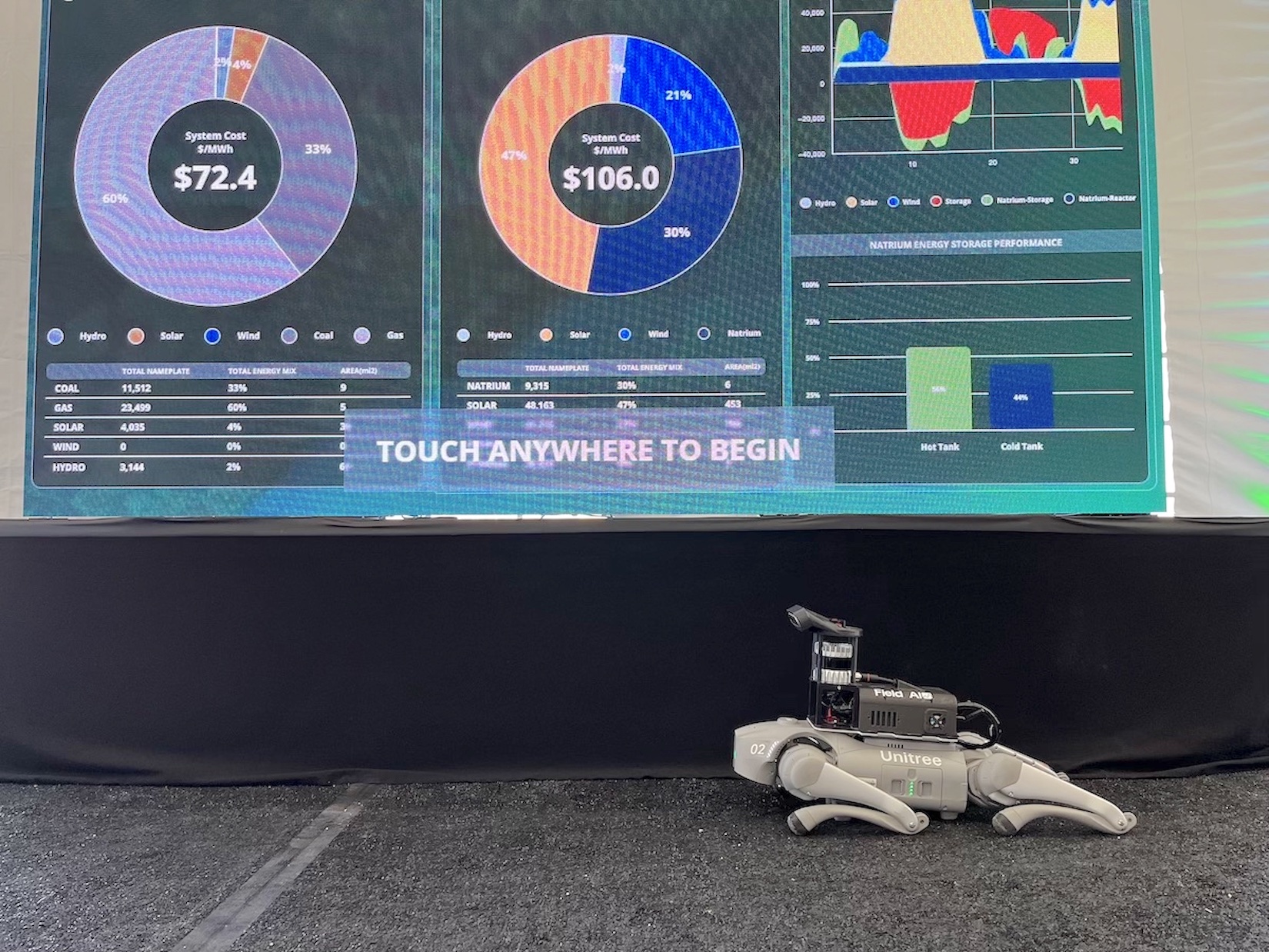Hungry for electricity, artificial intelligence firms are knocking on Wyoming’s door
By Wyoming News Exchange
October 29, 2024

An artificial intelligence-guided robot dog welcomed attendees of a nuclear power plant groundbreaking ceremony June 10, 2024 outside Kemmerer, Wyoming. Bechtel Corp. says it relies heavily on AI and drone technology to supplement its security staff and to aid with many aspects of construction. (Dustin Bleizeffer/WyoFile)
• The tech boom is ravenous for electrons. Wyoming, an energy powerhouse, weighs the potential opportunities and pitfalls.
By Dustin Bleizeffer, WyoFile.com
The artificial intelligence “revolution” that’s already reshaping business, culture and economies globally, comes with high electricity demands, creating myriad potential opportunities and pitfalls for Wyoming — an energy powerhouse.
That was the theme of a recent legislative committee discussion in Cheyenne. But so far, lawmakers are unsure how the state might navigate the waters beyond where it’s charted course in an already challenging electric utility market.
Is the unprecedented electricity demand an opportunity to extend the life of aging facilities that burn Wyoming coal? Will it ignite a nuclear power generation industry and revive Wyoming’s uranium mining industry beyond a few years this time, or will it erect a sea of wind turbines across the landscape? And what might it mean for electric rates that are already skyrocketing?
Though the Corporations, Elections and Political Subdivisions Committee considered one draft bill related to the issues — a measure to give utilities more negotiating powers when contracting with data center clients — members declined to move it forward as a body. Instead, the panel agreed to continue to explore the large, complex nature of what artificial intelligence computations might have in store for the state.
‘Enormous’ demand
Regardless of where data centers are built in the western United States, Wyoming will likely be called upon to help feed the surging power demand. Wyoming exports more than 60% of the electricity it generates to consumers in other states, according to federal data, and that role is likely to continue, whether via coal, wind, nuclear or other sources of energy.
Data centers, which essentially warehouse rows of computer servers, require a lot of electricity. Though the industry is making strides toward greater energy efficiency, burgeoning demand for the service is estimated to double the electrical power the industry requires by 2030, accounting for nearly 4% of global electricity demand, according to Goldman Sachs.
Closer to home, PacifiCorp — which serves six western states and operates as Rocky Mountain Power in Wyoming — has received inquiries from data computational companies to add more than 7,000 megawatts of new, yet-to-be-built electrical generation, officials say. That’s equivalent to adding one more state to its system.
“These are enormous [electrical] loads … and they want to come online at hyper-speed — in three years, five years,” Rocky Mountain Power Government Affairs Director Thom Carter testified. The artificial intelligence computation industry has “become a bit of an arms race,” Carter added. “Who’s going to build the biggest brain the fastest?”
For decades, PacifiCorp and Rocky Mountain Power have successfully planned for incremental demand growth of about 2% to 3%, Carter said. Meeting the anticipated demand for potential data computational customers would require more than doubling that pace.
The prospect is also top-of-mind for some city officials, particularly in Cheyenne.
Of the 11 data centers already operating in the state, according to DataCenterMap, eight are located in and around Wyoming’s capital city, taking advantage of the region’s access to high-bandwidth fiber. Though some of those facilities rely on wholesale power purchases that don’t necessarily come from Wyoming power plants, Cheyenne officials routinely hear from data and manufacturing developers who are eager for more power generation here.
“We have a lot of demands on electricity,” Cheyenne Mayor Patrick Collins told the committee. “We’re going to go from 350 megawatts [of power demand] to, who knows, 1,000 or more in the next five years.”
Collins credits electric utility provider Black Hills Energy, as well as the state, for crafting agreements with “large-load” data centers that allow for a sort of one-on-one arrangement to avoid shifting costs to regular ratepayers like small businesses and homeowners. Many of the centers rely on electricity that Black Hills Power purchases on the multistate wholesale market.
But, Collins told WyoFile, the prospect of a lot more electrical demand in the region is real, and the benefits of hosting data centers are worth figuring out how to make it work for Wyoming communities.
“These are good companies making huge — I mean, billion-dollar investments in our community — and they’re bringing really good, quality jobs,” Collins said. “I’m pleased by what’s happening.”
WyoFile is an independent nonprofit news organization focused on Wyoming people, places and policy.

